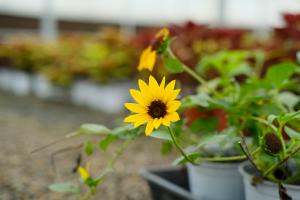Is Coconut Soil Good for Plants?
Coconut soil, also known as coir, is a popular and eco-friendly alternative to peat moss as a soil amendment or growing medium. Made from the fibers of coconut husks, coconut soil has been gaining popularity among gardeners and growers for its many benefits. In this article, we will explore whether coconut soil is good for plants and what advantages it offers over traditional soil amendments.
The Advantages of Using Coconut Soil
One of the main advantages of using coconut soil is its high water holding capacity. Coconut soil can hold up to ten times its weight in water, which makes it an ideal growing medium for plants that require a lot of moisture. Additionally, coconut soil is airy and allows for better drainage, which prevents waterlogging and root rot.
Another advantage of coconut soil is its ability to retain nutrients. Unlike peat moss, which is nutrient-poor, coconut soil is rich in minerals and micronutrients that plants need to grow. Additionally, coconut soil is pH-neutral, which means that it will not alter the pH levels of your soil. This makes it easier to adjust your soil’s pH levels for optimal plant growth.
Coconut soil is also sustainable and eco-friendly. Coconut husks are a waste product of the coconut industry, and using them as a soil amendment helps to reduce waste and carbon emissions. Coconut soil is also biodegradable and can be composted after use, which helps to reduce its environmental impact.
The Drawbacks of Using Coconut Soil
While coconut soil has many advantages, it does have some drawbacks. One of the main drawbacks of coconut soil is its high salinity. Coconut husks naturally absorb salt from the ocean, which can lead to high levels of sodium in coconut soil. This can be problematic for plants that are sensitive to salt, like strawberries and peppers. To avoid this issue, it is important to rinse your coconut soil before use or choose a low-salt variety.
Another drawback of coconut soil is its tendency to compact over time. Coconut soil is lightweight and fluffy when dry, but it can become dense and compact when wet. This can reduce the amount of oxygen that reaches plant roots and can lead to root rot. To prevent this, it is important to mix coconut soil with other soil amendments like perlite or vermiculite to improve its drainage.
Conclusion
So, is coconut soil good for plants? The answer is yes, with some caveats. Coconut soil offers many advantages over traditional soil amendments like peat moss, including its high water holding capacity, nutrient retention, and sustainability. However, coconut soil does have some drawbacks, including its high salinity and tendency to compact. By rinsing your coconut soil before use, mixing it with other soil amendments, and choosing a low-salt variety, you can overcome these issues and enjoy the benefits of using coconut soil in your garden or greenhouse.

 how many times do yo...
how many times do yo... how many planted tre...
how many planted tre... how many pine trees ...
how many pine trees ... how many pecan trees...
how many pecan trees... how many plants comp...
how many plants comp... how many plants can ...
how many plants can ... how many plants and ...
how many plants and ... how many pepper plan...
how many pepper plan...






























